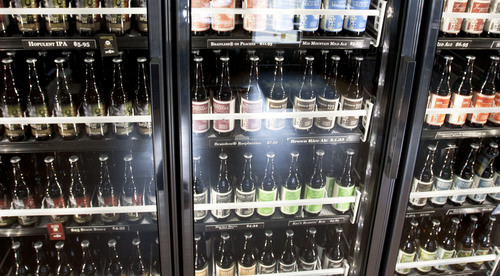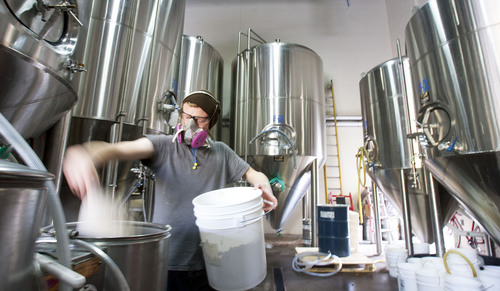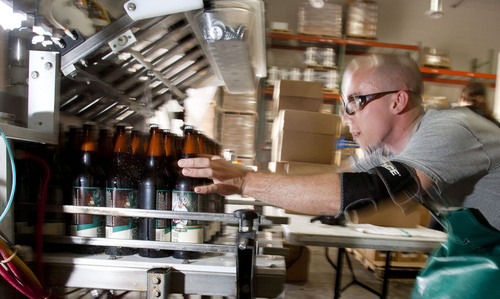This is an archived article that was published on sltrib.com in 2013, and information in the article may be outdated. It is provided only for personal research purposes and may not be reprinted.
Rep. Jack Draxler, R-North Logan, is brewing up a plan to increase wholesale beer taxes automatically every year to match inflation, with proceeds going to fund programs designed to combat underage and binge drinking.
That comes after legislators earlier this year put a cork in a separate proposal he made to raise taxes not only on beer but also wine and spirits by 4.65 percent, which Draxler said was designed to cut consumption more than to raise revenue. In fact, the state estimated that tax increase would have cut its revenues by $465,000 a year from reduced drinking, which helped to kill it in tight economic times.
"I want to index the beer tax to the Consumer Price Index so that every year we don't in real terms actually have a reduction due to inflation," Draxler said in an interview. "I do think that makes it more palatable. I think it addresses some of the concerns about the bill that was brought up last session."
He notes that last year the CPI was 2.9 percent. That would have raised Utah's current beer tax of 41 cents a gallon by 1.19 cents if his bill had been in place.
"So that would be only pennies [actually less] per sixpack of beer," Draxler says. "So it absolutely is not an oppressive tax, and it would probably raise somewhere around a quarter-million dollars. That's not a lot of money when you spread it around the state for prevention and treatment programs, but it would help."
The proposed tax is separate and apart from the sales tax at the retail level, which in Salt Lake County now averages 6.85 cents per dollar purchase.
He adds that raising taxes to match inflation would be so small "that it probably wouldn't have an effect on consumption" by itself. "We're trying to address that from the prevention side, teaching kids about the dangers to their brain and their physical well-being from underage drinking and also addressing binge drinking."
Draxler says such prevention and treatment programs, which the change would help fund, are needed because "studies show that while our rate of binge drinking is lower than the rest of the nation, those who do binge drink in Utah drink significantly more than binge drinkers in other states."
Draxler says he plans to present his proposal to the Interim Health and Human Services Committee later this month. "In real terms, it is not a tax increase. It simply maintains the tax in real terms where it is now, which in my opinion is still too low."
Jim Olsen, president of the Utah Beer Wholesalers Association, disagrees. "It is a tax increase."
He complains that Utah already has one of the higher beer taxes among the states. Its 41 cents a gallon tax ranks No. 14 among the states, according to the Tax Foundation. But Utah is surrounded by states with low taxes.
For example, the tax in Wyoming is 2 cents a gallon, the lowest in the nation. The tax is 8 cents a gallon in Colorado, 15 cents a gallon in Idaho and 16 cents a gallon in Nevada and Arizona.
Because of such disparities, Olsen says, an additional tax increase every year would mean "people definitely will potentially try to go across the state border to buy those products and bring them back."
Draxler scoffs at that. "The price adjustment is going to be so small that it would cost them [drinkers] more for gas — even to just drive 10 or 15 miles, let alone going to another state — than it is going to be in the increase in the price of beer." He adds his proposal would not raise taxes the first year after passage and would cap any increase at 4 percent a year to ensure hikes are not too burdensome.
Olsen has other concerns. He says if the increase is to help fight underage and binge drinking, "then it seems a little unfair to single out the beer industry and exclude wine and spirits."
Also, he says he too often sees a tax increase justified because proceeds would be earmarked to help a praiseworthy program, such as prevention and treatment. "But in a couple years, the earmarks are taken away and the money just flows into the general fund and those causes go underfunded."
In the 2012 election cycle, the beer industry donated $18,250 to Utah legislators and their political action committees, including donating directly to 26 of the state's 104 lawmakers. Earlier this year, the House Revenue and Taxation Committee voted 12-3 to kill Draxler's earlier proposal to raise taxes on beer, wine and spirits. —
About the tax
Would increase beer taxes to match inflation
Proceeds would fund programs to fight underage drinking
Would be separate from retail tax







